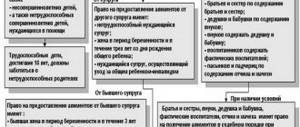Challenging paternity is a fairly common procedure that many fathers undertake who doubt the biological relationship with their child. Especially when the relationship has already been destroyed and alimony has been collected from them for the child.
Often, fathers’ suspicions are justified, and a DNA test carried out as part of a court assignment shows a negative result. And alimony has already been paid for a long time! And the father, freed from the obligation, begins to hope that he will be able to get a refund of alimony after challenging paternity.
Is it possible to return overpaid alimony: law
As you know, the issue of paying alimony does not always go smoothly and without complications. One of these complications is the return of overpaid alimony. So is it possible to return child support paid in an inflated amount or completely illegally? Definitely no. This action will harm the interests of the minor, and this is prohibited by the laws of the Russian Federation. However, the legislation defines the procedure for compensation of said damage by the guilty parties.
Yes, Art. 116 of the Family Code provides that alimony that has already been accrued is not subject to demand, with the exception of the following situations:
- Cancellation of a court decision on the payment of such alimony, due to the fact that the said decision was based on false information or forged documents;
- The invalidity of the agreement on the payment of alimony in connection with its preparation under the influence of threats, deception or violence on the part of the person receiving such payments;
- The presence of a court verdict, which established the fact of forgery of documents related to alimony payments (court decision, writ of execution, agreement).
The same article notes that if the above actions are committed by a person who is the parent or legal representative of the child, then the damage from such actions is recovered from the specified person in court.
IMPORTANT: The above list is absolutely exhaustive. There are no other cases when payments paid in favor of a child are subject to return. Even if paternity has been disputed and biologically the recipient of alimony is not the child of the payer.
In addition, there are cases when excessive calculation of alimony occurs due to the fault of an official, for example, an accountant of the enterprise where the payer is employed or a bailiff. In this case, in accordance with Art. 1102 of the Civil Code of the Russian Federation, compensation to the parent for damage caused is made by the specified officials. Child support. Again, they don’t take it.
Cancellation of a court decision to collect alimony
Reverse collection of alimony funds in cases provided for by the Family Code of Russia is possible only by a court decision to cancel the court decision on the collection of alimony.
The collection of alimony and the accrual of debt on it can be stopped only after the court makes a new decision on exemption from alimony payments.
The statement of claim is filed in court by the person who paid the alimony. The claim must include:
- name of the court;
- passport details and residential addresses of both parties - the plaintiff (in this case, the alimony payer) and the defendant (the alimony recipient);
- in the text part of the application, provide information about the court decision on the basis of which alimony was collected;
- a description of the essence of the circumstances that are the basis for canceling the collection of alimony (in this case, untrue data provided to the court for the collection of alimony);
- the petition itself addressed to the court for the cancellation of previously appointed alimony payments and the recovery of amounts received as amounts for the previous period;
- list of documents that are attached to the statement of claim.
Invalidation of an agreement to pay alimony
An agreement to pay alimony can only be declared invalid by a court decision.
It is possible to challenge an agreement on the voluntary payment of alimony concluded with minors or incompetent persons who are not aware of the actions being committed or concluded through deception and suggestion, a threat to life and health and other influences. The demands in the statement of claim must be to invalidate the concluded agreement on the voluntary payment of alimony and the return of funds paid under it.
The period for filing a claim to invalidate the agreement is calculated on a general basis and is three years.
In order for an agreement to be invalidated by a court, it must be proven that the agreement was signed fraudulently.
How to return overpaid alimony
There are situations in which an amount of money is collected from the alimony payer that exceeds the norm established by a court decision or writ of execution. Typically, this happens under the following circumstances:
- Erroneous actions of an accountant or other official related to the deduction of payments from wages or in the event of a technical error;
- Failure to timely notify the bailiff or other parties to enforcement proceedings about circumstances related to changes in the terms of monthly payments. Such conditions may be a reduction in the amount of alimony or the child reaching the age of majority.
- Incorrect data in the writ of execution that disagrees with the court decision. Typically this is caused by a typo.
- Deliberate actions of an official who is assigned the obligation to transfer alimony and calculate it, etc.
If the situation is one-time and the amount of overpayment for the payer is insignificant, then the issue can be resolved amicably without resorting to methods of influence, such as litigation. However, such situations are rare.
Fake documents to obtain alimony
Many fathers are concerned about the problem of returning paid alimony if they find out that payments were made using forged documents or it turns out that they are not the real father of the child for whom alimony was collected.
Also, if the agreement on voluntary payments or the writ of execution was forged.
It is possible to return the money paid, but again, only by court decision at the expense of the direct culprits. A statement of claim for the return of money paid for alimony using forged documents is drawn up according to a standard form.
Clarification of all the circumstances in court may serve as the reason why the documents that became the cause of the award of alimony will be cancelled.
The law does not provide for reverse recovery of alimony. But, in exceptional cases, when the recipient has somehow fraudulently achieved the assignment of withholding alimony, it is possible to hold the recipient of alimony accountable and collect the money.
The main thing is that all claims for the cancellation of decisions on the collection of alimony, and the return of the amount paid, are filed in the name of the plaintiff, against whom the collection of alimony was once established.
Author of the article
If alimony is transferred excessively, can it be returned?
In case of disagreement with the accrued alimony, the payer will not be able to return the overpaid amount - this is prohibited by law. However, the latter has the opportunity to recover the material damage caused from the person responsible for it.
Thus, an unreasonable overestimation of the amount of payments may occur due to the fault of the accountant who deducts alimony from the payer’s wages. In such cases, first of all, it is better to solve the problem peacefully. Thus, an accounting employee can be motivated to return excess funds from personal funds, indicating that the latter’s actions are a violation of both family and labor legislation of the Russian Federation. Otherwise, the solution to the issue of compensation for lost wages is subject to judicial review.
However, there are also situations when an erroneous excess of alimony payments occurs not through the fault of the accountant, but as a result of a calculation error as a result of a malfunction in the program.
In this case, the accountant’s actions will not bear any signs of unjust enrichment, and the collection of personal funds from the latter will be unlawful. In this case, overpaid funds can be counted, at the request of the parent, towards payment for subsequent periods during enforcement proceedings.
It also happens that the legal rights and interests of parents paying child support are affected by unlawful actions of employees of the enforcement service. In order to resolve this issue, Russian legislation provides for the right of payers to recover damages caused from the guilty employee of a government body. This right is provided for in Part 2 of Art. 119 Federal Law “On Enforcement Proceedings”.
How to get child support back when challenging paternity
However, the reason for illegally paid alimony is not always the mistake of an accountant or the unlawful actions of the recipient of such alimony, provided for in Art. 116 RF IC.
A fairly common practice is to support a child through alimony payments by a person who is not the latter’s biological father. In most cases, a man learns that the child is not his own at the moment when alimony payments have been accrued for quite some time. At the slightest suspicion that there is no family connection with the child, it is necessary to go to court to challenge paternity in court.
But challenging paternity will only help to challenge alimony in court in the future, but will not return what has already been paid...
How to challenge paternity and return child support?
Some lawyers believe that if it is possible to prove the intentional exchange of a man on the mother’s side, alimony can be returned. However, this is not so - the family code. As mentioned above, it provides an exhaustive list of grounds for the return of alimony.
The mother's deception does not appear there and does not give the man the right to return previously paid alimony. In order to refute paternity in court, you must do the following:
- Go to court with a claim to challenge paternity;
- Conduct a genetic test to establish paternity (preferably by court order to exclude the recognition of the examination results as subjective);
- Prove that the child’s mother knowingly knew that the child was conceived by another man, but at the same time intentionally misled the alimony payer.
And if in the first case, the court can easily order a DNA examination, then proving the mother’s intent may not always be an easy task. The ideal option is for the mother to voluntarily admit to deceiving her ex-husband, however, such cases are extremely rare.
In practice, the plaintiff is forced to independently prove the bad faith of the child’s mother. The following information can be used as evidence:
- Telephone or Internet correspondence, the topic of which is a discussion of the fact of the plaintiff’s lack of paternity;
- Evidence obtained through audio and video recordings, which recorded the admission by the recipient of alimony that the plaintiff is not the biological father of the child;
- Testimony of witnesses who can confirm the deliberate concealment of information about the real father of a minor.
After studying all the evidence provided and considering the case on its merits, the court makes a decision to satisfy the claims or to refuse it. If a decision is made in favor of the plaintiff, the latter is relieved of the obligation to pay alimony for someone else’s child and fulfill other legal obligations (hereditary, property, etc.). But previously paid alimony is not returned and remains in favor of the child.
Important! The consideration of the court case in favor of the plaintiff can be completed only if it is established that the fact of deliberate concealment of information to the real father of the minor is established.
Judicial practice: is it possible to return excess alimony?
Judicial practice in cases where the subject is challenging paternity is quite disappointing for plaintiffs. After all, it is quite difficult to prove the deliberate concealment of true paternity by the mother of a minor, since courts, when considering such cases, rely exclusively on the norms of family and civil law.
Even if deception is established, the mother did not commit any direct actions that can be documented. The RF IC only allows the return of alimony under an incorrect agreement concluded under the influence of deception, but not when paternity is contested.
To more effectively study the issue, the court would also need to be guided by criminal law, but this decision may entail consequences such as criminal liability of the mother, which is likely to harm the interests of the child.
In addition, even if the trial ends in favor of the plaintiff, then in this case the legislation is more inclined to satisfy the interests of the mother and child. For example:
- Collection of previously paid alimony ceases only after the court decision enters into legal force;
- The alimony arrears accumulated before the consideration of the court case in essence must be paid without fail;
- The collection of previously paid alimony will only apply for a certain period of accrual. This is three years from the date of establishment of the fact of non-paternity.
In the case of compensation for overpaid alimony based on unlawful actions of officials, judicial practice is much simpler. Thus, if an accountant exceeds the amount of alimony deducted from wages, it can be proven by submitting a salary extract to the court. And in relation to court orders, you can operate on the discrepancy between the accrued amount and the instructions of the court decision or writ of execution. In both cases, compensation for material assets is assigned to those responsible for causing the losses.






